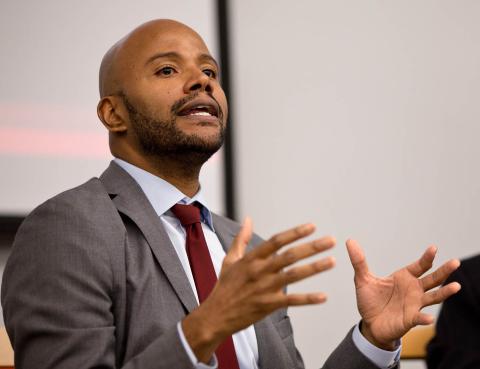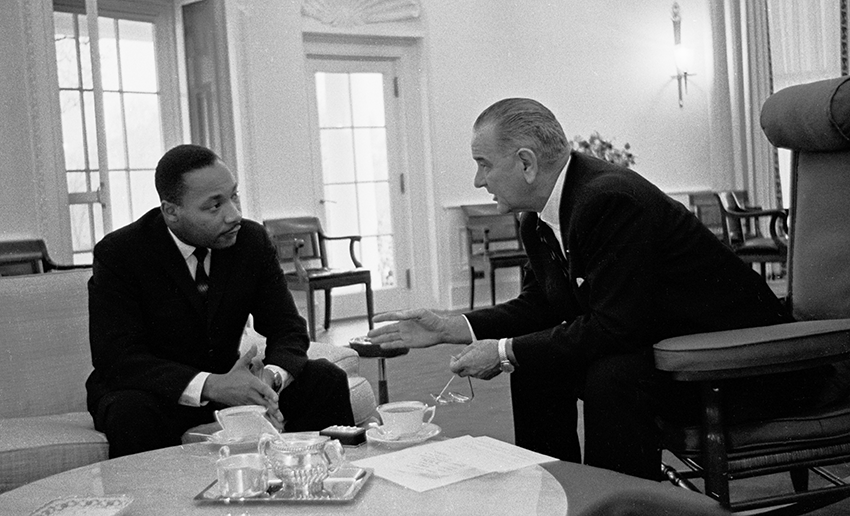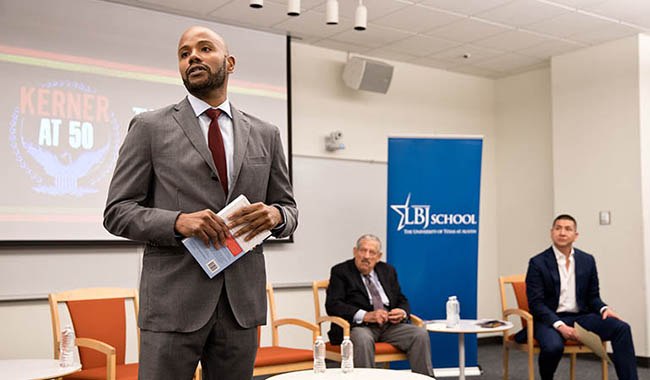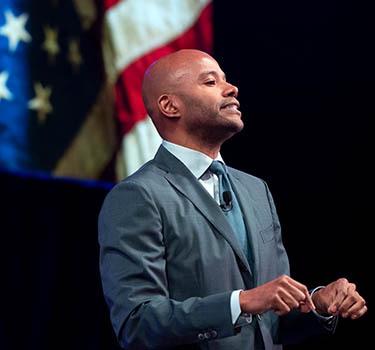
Dr. Peniel Joseph is a leading civil rights scholar, teacher and public voice on race and democracy.
A statement from the inaugural associate dean for justice, equity, diversity and inclusion:
It is truly an honor to serve as the LBJ School of Public Affairs' inaugural Associate Dean for Justice, Equity, Diversity and Inclusion (JEDI). My interest in issues of equity, inclusion and anti-racism are deeply personal. As the proud son of Haitian immigrants, I grew up in a multiracial New York City during the 1980s. My mother worked at Mount Sinai Hospital as a member of Local 1199 union, and I was fortunate to encounter the city's racial, religious, ethnic and ideological diversity at an early age. These experiences, I would later find out, were made possible in part by President Lyndon Johnson's commitment to equity and inclusion through Great Society legislation that transformed the nation's demographics.
I believe that the best way to cultivate equity, diversity and inclusion is by centering the search for justice in these endeavors. The policy arena is integral to molding, shaping and debating public conceptions of justice. The goal of America, Dr. Martin Luther King Jr. wrote, "is freedom." This enduring search for freedom from all forms of discrimination, hatred, violence and inequality is what justice looks like in the public sphere. The Civil Rights Movement of the 1950s and 1960s reflected the importance of centering justice in American society, our national politics, and our public policy. The 1954 Brown Supreme Court decision that declared "separate but equal" unconstitutional, the 1964 Civil Rights that ended racial segregation in public accommodations, and the 1965 Voting Rights Acts that enfranchised Black Americans represented the convergence of laws and legislative decisions with a sense of justice that reverberated nationally and around the world.
"I believe that the best way to cultivate equity, diversity and inclusion is by centering the search for justice in these endeavors. The policy arena is integral to molding, shaping and debating public conceptions of justice."
As a policy school, issues of Justice, Equity, Diversity and Inclusion shape the LBJ School's teaching, research and service. Among the Great Society's enduring legacy is a public commitment to justice by ending racial and economic barriers of exclusion and expanding the promise of American citizenship to historically underrepresented groups.
Dr. King characterized justice as a public expression of love. President Lyndon Johnson anchored his personal belief that America could be a more just nation through visionary legislation that expanded the boundaries of citizenship and the scope of American democracy. President Johnson embraced civil rights as a cause that "lay bare the secret heart of America itself."

President Johnson and Dr. King represent exemplary models of engaged citizenship, belief in America's democratic potential, and willingness to participate in struggles to change hearts, minds and policies. At their best, President Johnson and Dr. King created one of the most important partnerships in American history, one that resulted in the passage of landmark civil rights and voting right legislation that pushed the nation toward becoming a more perfect union.
The racial justice demonstrations that gripped the national and global imagination in 2020 have deep roots in structural inequities, injustice and exclusion impacting a wide range of communities. The racial and political reckoning in the wake of George Floyd's killing sparked political and policy debates about ways to end injustice and strengthen democracy in the 21st century. The watershed events of last year cast a spotlight on the ways in which public policies in arenas such as criminal justice, voting rights, health care, energy and the environment shape not only the health of communities but also the horizons of our democratic potential.
"As a scholar and researcher of the civil rights era, I have marveled at the generational opportunity ahead of us, both as a nation and the LBJ School community, to help end inequality and discrimination, heal ancient wounds that threaten the health and future of our democracy, and achieve bold, innovative and impactful research initiatives that match the scope and scale of the challenges we face as a nation."

In 2021 we find ourselves at another crossroads; an era marked by divisions based on geography, identity, partisanship and much more. The path taken by the LBJ School at this moment is particularly significant as a new generation of young future leaders in policy and public service enter our doors. "There is no issues of states' rights or national rights," President Johnson reminded Americans during his March 15, 1965 address to a special congressional session in support of voting rights. "There is only the struggle for human rights."

As a scholar and researcher of the civil rights era, I have marveled at the generational opportunity ahead of us, both as a nation and the LBJ School community, to help end inequality and discrimination, heal ancient wounds that threaten the health and future of our democracy, and achieve bold, innovative and impactful research initiatives that match the scope and scale of the challenges we face as a nation. A deep recognition that justice was more than an abstract philosophical notion marked Dr. King's commitment to policy transformation. King's call for the nation to become a "Beloved Community" free of racial injustice and economic inequality resonates now more than ever. The LBJ School is uniquely positioned to take a leading role in educating a new generation of policy leaders to confront the most pressing local, national, and global challenges of our time.
I look forward to working closely with Dean JR DeShazo to amplify the LBJ School's commitments to teaching a diverse student body, attracting and retaining diverse faculty, and refining curriculum and pedagogical innovations that better enable students to study, recognize and reduce discrimination and inequity. I am committed to promoting a culture of respect, civility and empathy for one another that recognizes the ways in which our service-oriented leadership as a public affairs school can offer the entire LBJ community impactful opportunities to change the world.
As Associate Dean I am excited about the opportunity to help our already vibrant LBJ School community grow, cultivate and amplify our commitment to core JEDI values of justice, diversity, equity and inclusion along the three areas—composition, culture and curriculum—outlined by Dean DeShazo.
I am excited to embark on this journey together.


